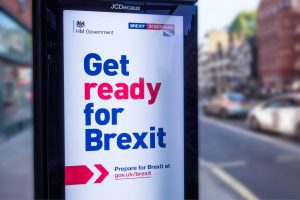The UK government’s Get Ready For Brexit campaign was, this week, described by auditors as ineffective – Phil Gault suggests the campaign’s strategy worked, just not how it should have.
Did you go large on Friday?
I was definitely tempted. Not because I’m any fan of Brexit; but because the journey to 31st January 2020 has been long, convoluted, abrasive and often tedious. Frankly, I think we all deserved a drink.
Buying the country a round would have been a different way of spending the £46m the government put into its (ultimately aborted) “Get Ready for Brexit” campaign. From what the National Audit Office has reported, it might have been a better use of our money. It found that, based on the proportion of UK citizens looking for information on Brexit, it was “not clear the campaign left the public significantly better prepared”. I think we can safely translate that as meaning it had no (or very little) impact on behaviour.

But that doesn’t mean it had no impact on attitudes. As the Cabinet Office proudly pointed out, the campaign reached 99.8% of the population with a staggering average OTS of 55. That’s blanket coverage with the heaviest bedspreads and duvets money can buy.
Repetition is key to effective advertising. The government obviously understands this, and something else besides. If you want to shift attitudes, there’s real power in promising inevitability; be that whiter teeth, cleaner clothes…or the ‘sunlit uplands’ of a post-EU Britain. In this sense, “Get Ready for Brexit” could well have been an even more effective message than “Get Brexit Done”. The latter provided the option of choice (“I’d rather not, thanks all the same”). But there’s no arguing with the former. Decode it, and it’s saying: “This thing is going to happen, so get over it”.
One of the great advantages of power is that it allows you to knit together ‘public service’ and ‘political’ messaging. The government was in a position to establish inevitability, and then follow up immediately with a solution to inevitability. It might have been a happy accident, but there were strong echoes between Boris’ “oven-ready deal” and the language of the public service campaign.
When discussing this with colleagues, the conversation quickly turns to morality. If this was a conscious, carefully planned strategy by the government, is it fair and right that public money be used to prepare the ground for political campaigning? The easy answer is “no, it’s not”. But things are a little more complex than that. In making any decision – including commissioning and approving advertising – we’re all driven by the incentives and biases we bring to the table. And when people know what’s going to happen next (for instance, what their platform is going to be in the election campaign), you can’t forget or ignore that when making other calls.
So rather than morality, let’s focus on reality. Someone once said: “It would not be impossible to prove with sufficient repetition and a psychological understanding of the people concerned that a square is in fact a circle”.
It seems the Cabinet Office has grasped this too.

